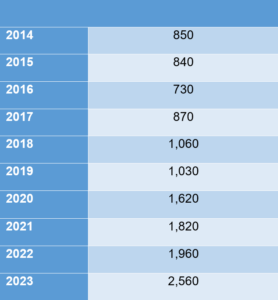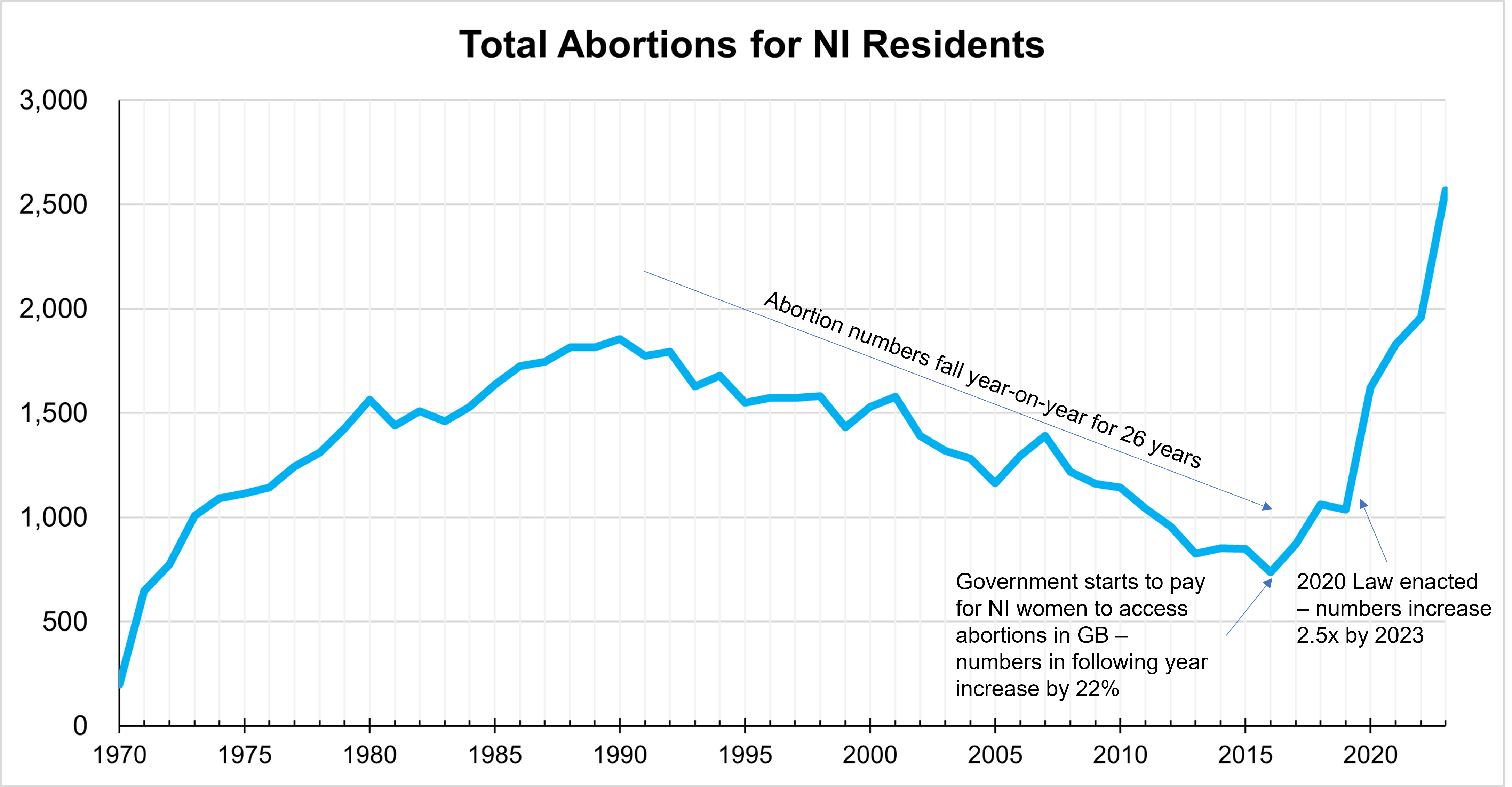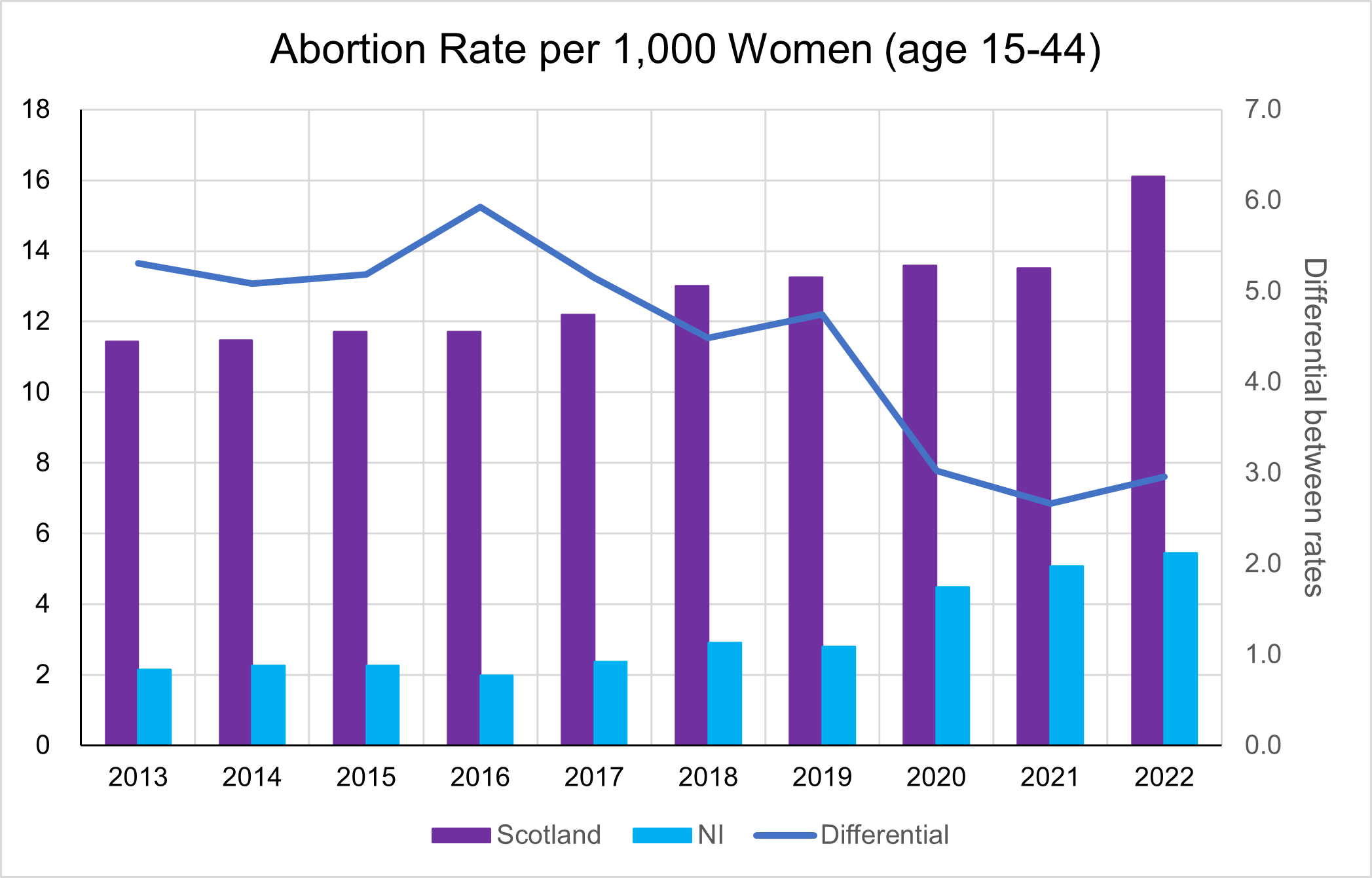Independent public health consultant Kevin Duffy shows how permissive abortion laws lead to more abortions
In Northern Ireland, it has been shown that a law restricting abortion saved more than 100,000 lives in the years from 1967 to 2016. Since that law changed in March 2020, there has been a two and a half times increase in the annual number of abortions.
For more than 50 years, the law in Northern Ireland only permitted abortion if it was necessary to save the life of the pregnant woman. The 1967 Abortion Act in England and Wales, which is widely interpreted to permit abortion on request, was not extended to NI.
In 2017, Both Lives Matter published a study and conducted a marketing campaign in which it claimed that because NI had not embraced the permissive 1967 Abortion Act, more than 100,000 people were alive who would have had their lives ended in utero by abortion, (Both Lives Matter report here).
Some people were upset by this claim and made official complaints. The Advertising Standards Authority (ASA) conducted its own analysis and, after consulting with expert healthcare statisticians, concluded that there is a reasonable probability that 100,000 individuals are alive today in Northern Ireland who would not be if Northern Ireland had introduced the 1967 Act (ASA Report here).
During the years since the 1967 Act, some women travelled from NI to England to access abortion services there; elective abortion services were not available in NI. In March 2020, Westminster enforced a new abortion law in Northern Ireland that is even more permissive than the 1967 Act. Initially, the Department of Health in NI was slow to begin providing abortions, but early medical abortion is now easily accessible.
Abortion statistics for NI are published annually by both the Department of Health and Social Care (DHSC) and the Department of Health (DoH), though it is worth noting, as reported by Dawn McAvoy at Both Lives Matter, that there is presently no legal framework in place to ensure full and accurate reporting on all abortions carried out in Northern Ireland.
In the absence of full and complete statutory reporting, we need to make Freedom of Information (FOI) requests for data. In October 2023, the DoH responded to a FOI request made by Abolish Abortion NI, providing summary abortion statistics data from 31 March 2020 up to 20 October 2023, showing an overall total of 6,924 in that period.

Based on these official published data, the numbers of abortions for each of the last ten years are shown in this table. Please note that the number for 2023 is extrapolated for a full calendar year from the above-mentioned FOI response. These numbers include abortions provided to women in NI and those provided to NI residents accessing services in England and Wales.
As can be seen, there has been a significant increase in the annual numbers in the years following the introduction of the 2020 law; the number of abortions in 2023 will be two and a half times more than those reported in 2019.
A response to an earlier FOI request made by Both Lives Matter reported a total of 5,648 abortions in the period from the end of March 2020 up to 23 May 2023.
An extrapolation based on the additional number of abortions reported in the October FOI response compared with the one in May, indicates that the trend for annual totals is increasing, and if this rate continues the total in 2024 could reach 3,100.[i] Such an annual total, a direct effect of the 2020 permissive law, will sadly wipe out the life-affirming impact of the prior law that Both Lives Matter analysis showed was saving on average 2,000 lives each year.

Figure 1: Data sources DHSC and DoH; analysis K Duffy.
Annual abortion numbers in Northern Ireland reached a peak of about 1,850 in 1990, after which numbers fell year-on-year for 26 years. In June 2017, the UK government announced that it would start to fund abortions in England and Wales for women resident in NI. Prior to this, women from NI could access abortions in GB but were required to pay the abortion provider directly. This change in legislation resulted in a 22% increase in NI women travelling to GB for an abortion in 2018, as the DoH explained in its 2018/19 annual statistics report.
This graph very clearly shows the steep increase in the number of abortions in the three years following the implementation of the new, permissive, abortion law in March 2020.
In its 2017 ‘One Hundred Thousand’ report, Both Lives Matter says this about the impact of abortion law:
“Law has an important role in shaping perceived social norms, which are a powerful driver of attitudes and behaviours, within society. A strong signal is sent to society when laws are changed – in the case of the 1967 Abortion Act, the signal being sent is that abortion is “ok” and “normal” far beyond any medical reasons. As abortion becomes more ‘acceptable’, more women who might otherwise have rejected it as an option are willing to consider it.”
It is interesting, and perhaps somewhat sobering, to consider how the 2020 abortion law might now shape the social norms in Northern Ireland. Historically we find significant differences in the rate of abortions across the nations, indicating that there has been something different happening in NI.

Figure 2: Data sources DHSC, PHS, and DoH; analysis K Duffy.
In 2013, the abortion rate per 1,000 women aged 15-44 was 2.2 in NI, less than one fifth of the rate of 11.4 in Scotland. Both Lives Matter and others have argued that culturally NI and Scotland are quite similar, and so this marked difference might indicate the impact of the abortion law in each country. Before 2020, NI’s law was restrictive and Scotland’s law was broadly permissive, similar to England and Wales. We can see by 2022, the rate in NI (5.4) is now just a third of the rate in Scotland (16.1), perhaps already showing the impact on societal behaviour of the permissive 2020 abortion law. It is also interesting to note on this graph the uptick in Scotland in 2022 that may be due to the increasing impact of abortion by telephone and pills-by-post, an abortion regulation that further normalises abortion, and making it much easier to access.
Abortion activists in Great Britain are lobbying for decriminalisation: to remove abortion from the criminal law and to make it available on request for any reason, with no limits. Ironically, they cite the 2020 NI law, saying that the rest of the UK now needs to catch up; that it is not right or proper for our sisters on the mainland to suffer restrictions that those in NI are now free from.
Do we really want abortion to be free from lawful restrictions and mandated standards of care; sending a message that it is of little consequence, leading to a growing societal acceptance that abortion as birth control is not just okay but that it’s normal?
The recent YouGov poll on abortion has been lauded by some as showing how pro-choice we all are, and yet the results show significant, and some majority, concerns when the more detailed questions were asked:
- One in three women think the 24-week abortion limit is too late, and should be brought forward to earlier
- Two thirds of Britons think that abortion after 24-weeks should only be available under a very small number of special medical circumstances
- Forty-two percent think that the pills-by-post legislation should be rescinded and that the provision of abortion pills should only be allowed under medical supervision at a clinic
- More than half of Britons oppose the removal of restrictions that would allow abortion pills to be bought over the counter, without prescription, at pharmacies
- Almost two thirds support a mandated requirement for women to have counselling before deciding to have an abortion.
We need better abortion laws; we don’t need or want these laws removed or to become so permissive that they lack any meaning or due influence. Abortion laws matter.
[i] There are 1,276 more abortions reported in the October response, compared to the May response; there are 150 reporting days between the two FOI responses; (1276/150*365) = 3,105.


